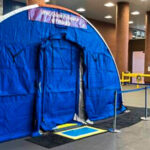A Potential Winter “Tridemic” of RSV, Influenza, COVID, and Hospital Surge
A new health warning of a potential “tridemic” is putting hospitals across the United States on high alert. An early surge in pediatric respiratory illnesses (including RSV), rising cases of influenza, and the ongoing battle against Covid could push an already taxed healthcare system beyond capacity.
Already, nationwide hospitals are at 75% capacity. In some states, hospitals are at more than 90% capacity. The unseasonably high numbers of pediatric patients admitted for respiratory infections are causing the early bed shortages. According to the Centers for Disease Control and Prevention (CDC), case numbers for respiratory illnesses have tripled in the last two months and reached peak levels in 2021.
States seeing an early onset of the “cold and flu” season and above 85% bed capacity include Rhode Island, the District of Columbia, Texas, Delaware, Maine, Arizona, Oklahoma, Missouri, and Kentucky. In total, 23 states have reported a higher-than-expected rate of pediatric infections.
What is RSV?
RSV is an abbreviation for Respiratory Syncytial Virus. It is a highly contagious virus that can spread through droplets released into the air when an infected person coughs or sneezes, touches a contaminated surface, or through direct contact. A person infected with RSV is usually contagious for 3 to 8 days, though infants and those with weakened immune systems can continue to infect others for as long as 4 weeks!
RSV causes infections of the respiratory tract. Symptoms usually appear within 4 to 6 days after getting infected and include a runny nose, decreased appetite, coughing, sneezing, fever, and wheezing.
Most healthy adults and infants infected with RSV experience mild, cold-like symptoms and do not require hospitalization. Those at a greater risk for severe illness include premature infants, children under 2 years old with chronic lung disease or congenital heart disease, weakened immune systems, and neuromuscular disorders. For these individuals, RSV can cause severe infections, including bronchiolitis (inflammation of the small airways in the lungs) and pneumonia.
Each year, 58,000 children under 5 years old and 177,000 adults 65 and older are hospitalized due to RSV infections. There are 500 children and 14,000 adult deaths attributable to RSV each year. Treatment may require oxygen, intubation, or mechanical ventilation to help with breathing. In most cases, hospitalization lasts a few days.
Why are Infectious Respiratory Illnesses Surging Early?
Typically, RSV and other respiratory infections surge in the late fall and winter and decrease during the spring and summer. “It’s very regular and predictable,” said Rachel Baker, an epidemiologist and assistant professor at Brown University.
This year, however, cases of respiratory illnesses started rising in the spring. Influenza infections are also increasing earlier than usual.
Why the early surge of infectious respiratory illnesses?
Health experts believe the unprecedented early surge of RSV and other respiratory infections is the result of the lockdowns, physical distancing, and hygiene practices recommended to protect us and limit the spread of COVID-19 over the last two-and-a-half years.
Now that people are returning to work, going to gyms, children returning to school, enjoying indoor activities, and interacting without masks, it has allowed viruses, including RSV, and other respiratory viruses, to target those that fall in the “immunity gap.”
According to Baker, “those interventions, while they were great at limiting the spread of COVID-19, they also did a really good job of limiting the spread of respiratory diseases such as RSV and influenza. …Decreased exposure to endemic viruses created an immunity gap – a group of susceptible individuals who avoided infection and therefore lack pathogen-specific immunity to protect against future infection.”
Baker and a colleague recently published an article in a medical journal (The Lancet), explaining that it could take a few years for RSV and other respiratory illnesses to return to a predictable cycle.
Are Hospitals Prepared for a Tridemic Surge?
A nationwide shortage of healthcare workers combined with the recent spike in pediatric hospitalizations is already creating “all hands on deck” situations reminiscent of those seen during the peak of COVID-19 – when hospitals were forced to pause surgeries, deploy field hospitals for surge capacity, turn people away, or enact crisis standards of care (CSC). Especially in pediatric hospitals across the country.
Juan Salazar, the Physician in Chief at Connecticut Children’s Medical Center, who has worked in infectious diseases for 30 years, says, “During my tenure here, I haven’t seen anything like this.” Describing the conditions, he said the emergency room is full, and patients are being triaged in the hallways. At times, as many as 25 children with RSV are waiting for an inpatient bed. Teens are being redirected to nearby adult-care facilities. Doctors from other departments (and specialties) are being mandated to work with RSV patients. The hospital is in talks with the National Guard and FEMA to help set up a field hospital to increase capacity.
It’s a scene playing out in many children’s hospitals across the country.
Despite declining coronavirus cases and hospitalizations, health professionals are concerned about low coronavirus vaccination and booster rates against a winter influx of variants and a susceptible population to influenza and RSV. According to Andrew Pavia, an infectious disease expert at the University of Utah Health and Intermountain Primary Children’s Hospital, “the ingredients are in place for all three waves overlapping.”
Should a confluence of RSV, influenza, and COVID-19 occur, hospitals will easily be overwhelmed by waves of mass infections. Whether patients are sick with COVID, influenza, or other illnesses like RSV, hospitals cannot accommodate any additional surges. “There’s no excess capacity in hospitals,” said Doctor Carlos del Rio, an executive associate dean at the Emory University School of Medicine and Grady Health System in Atlanta.
BLU-MED Medical Shelters and Field Hospitals for Patient Surges
For more information about BLU-MED or our negative pressure rooms and mobile field hospitals and medical shelters, call us at +1-(888)-680-7181 , email inforeq@blu-med.com, or fill out the online inquiry form on our contact page.


